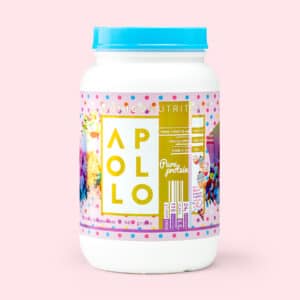More, more, more! Society tells us that more is always better. But is the same true with protein powder? How much protein should you take per day, anyways? Let’s find out.

(First off- more coffee is always better. Except on pre-workout days lmao).
But seriously – it is so easy to fall into the trap of thinking that more is always better.
However, the truth is usually that moderation is usually better than the extremes.
You might be surprised to know that the same is actually true with protein powder as well.
With so many different types of protein powder, with different formulations, ingredients, nutrients, and benefits, it can be tough to figure out exactly how much protein powder you should be taking per day.
Today we’re going to break down the current best practices and recommendations for daily protein intake, and help you identify your optimal daily protein powder amount.
The Benefits of a High Protein Diet
If you’re thinking about adding a protein powder to your diet, you might be wondering what the end goal is…
In other words why do we even need protein in our diet to begin with?
So before we get into the perfect amount of protein powder per day – let’s reverse engineer this one important fact:
Everyone can benefit from having an adequate amount of protein powder in their diet.
Now.
As we said earlier – that’s not to say that everyone needs to drown themselves in protein shakes to try and cram 300 grams of protein into their daily diet.
But getting enough protein in your diet is essential for a number of reasons.
There are several benefits to a high-protein diet – many of them involving much more than having beach-ready muscle tone.
Here are a few of the key benefits of getting enough protein daily:
Increased Muscle Mass
Supplementing with protein powder has been shown to help you build muscle — and keep it.
Protein, and particularly the amino acids that comprise it, are the very building blocks of our muscles.
Making sure our bodies get enough protein is one of the first steps toward muscle gains and increased strength.
Quick Tip: Immediately after a workout is one of the best times to drink a protein shake – the amino acids help re-build and repair your fatigued muscles so that you can get back in the game sooner!
Increased Metabolism
No, protein is not a magical metabolism supplement…but it does have one very fascinating metabolic ability.
Eating a high-protein diet gives your metabolism a big boost – meaning you will burn more calories at rest.
Elevating metabolism is just one of the many ways that protein powder helps you lose weight.
A high protein intake really does increase the number of calories you burn in a day.
This is due to something called the thermic effect of food, or TEF.
TEF is a measure of how many calories it takes to digest different foods.
Protein has a thermic effect on food that is around 30%, meaning 30% of the calories from protein are used for digestion and metabolization.1
That’s much higher than the thermic effect of carbohydrates and fats, which both fall somewhere in the 15% range.
Eating more of your daily calories from protein will give you a boost in calorie burning of anywhere between 80 and 200 calories per day, depending on how much you eat.
The takeaway here?
Protein provides a metabolism boost that other nutrients don’t- helping you to burn more calories.
Increased Satiety
Protein has also been found to be more filling than carbs or fat.
That extra satiation that you get from protein can help you avoid taking in excess calories throughout the day.
So, why is protein so filling?
It’s because of the effect protein has on hunger hormones like ghrelin.
Protein sends powerful signals to your body to stop producing hunger hormones, resulting in a feeling of fullness and satisfaction.
There are many benefits to a high protein diet — but how much protein is too much? How much of your daily protein intake should come from protein powder and how much from whole food sources like chicken, turkey, beef, quinoa, and eggs?
Let’s get into it.
How Much Protein Should I Be Eating per Day?
To figure out how much protein powder should should get in a given day, it helps to start by figuring out how much total protein you need.
The Bare Minimum:
Current baseline health recommendations say you should get 0.36 grams of protein / pound of body weight per day.
Example: A 140-pound female should eat roughly 50 grams of protein per day. (140 * 0.36 = 50.4)
Now.
50 grams of protein may sound low to you, and chances are that it is too low for you – especially if you live an active lifestyle.
Think of the 0.36 grams/lbs. metric as a bare minimum to ensure that you’re not malnourished.
However, the demands of an active lifestyle are going to leave you feeling quite sluggish if all you are meeting is this minimum.
If you are exercising 3-4x per week, and/or leading an active lifestyle (walking, frequently on your feet, using stairs, etc), you are going to want to eat a higher protein diet.
You are hardly going to reap the benefits of a high-protein diet eating just 50 grams per day.
But how do you know how much more protein above this minimum you should aim for?
There are two easy ways to calculate an ideal protein intake for you:
- Grams per pound
- Percentage of daily calories
Let’s take a look at each of these too methods for helping determine how much protein is best for an active lifestyle.
1. Grams-per-Pound Formula
The grams per pound formula is going to be best suited for super active individuals like athletes or serious fitness enthusiasts.
That’s because the amount of protein that athletes, or active people need in a day is pretty different from the needs of someone who just works out once or twice a week.
Luckily, these high-energy-output individuals can easily figure out your protein needs using the grams-per-pound formula.
This formula recommends a certain number of grams of protein relative to your body weight.
We know minimum healthy guidelines are 0.36 grams per pound of body weight, but to get a high-protein diet, you’ll need more than that.2
Modern research suggests that athletes need anywhere between 0.5 and 0.9 grams of protein per-pound in order to perform at the highest level.
A good middle ground that should serve most athletes well is 0.75 grams per pound, for both men and women.
| Weight | Protein/Day |
| 120 | 90g |
| 140 | 105g |
| 160 | 120g |
| 180 | 135g |
| 200 | 150g |
As you can see, an athlete needs roughly double the amount of protein as more sedentary individuals.
The grams of protein per pound formula is a fairly reliable way to suggest daily protein requirements.
Anther popular way is by calculating protein as a percentage of daily calories.
Percentage of Daily Calories
The alternate method to figure out daily your daily protein needs is using the percentage of daily calories formula.
The recommended percentage of calories that should come from protein varies according to activity level.
Anywhere between 10% and 30% of your calories should come from protein, with 10% mapping to a more of a ‘minimum acceptable level’, and the 30% being on the higher side.
A high-protein diet, general recommendations suggest that 25% of your daily calories should come from protein.
Again, those following an active lifestyle should opt for a high-protein diet in order to benefit most.
Let’s dive into some examples of how to use the % of daily calories method.
It’s important to recall that protein has 4 calories per gram, while carbohydrates also have 4, and fats have 9.
So for someone adhering to a 2000 calorie diet, and wanting to use the % of calories method to determine a good amount of protein per day.
The math would look something like this:
Find the total calories to get the total calories we want from protein: For this high-protein diet we want 25%, or one fourth of the calories to be from protein. So 0.25 * 2000 = 500 calories total from protein.
Translate calories into grams by dividing by 4: Since we know that protein delivers 4 calories per gram, we want to divide our 500 calories by 4. So 500/4 = 125 grams of protein.
So a high-protein 2000 diet would consist of 125 grams of protein.
For someone eating 3000 calories per day, a high-protein diet would include over 180 grams of protein.
Let’s put that amount of protein in context, so that it’s not so abstract.
Do You Need a Protein Powder?
As we discussed earlier, a high-protein diet can be extremely healthful for those looking to lose weight, or perform at a high level.
Our protein requirement calculations told us that a high protein diet, even for someone eating a relatively small amount of calories per day, still calls for about 125 grams of protein.
Let’s look at some of the most common high protein foods, and how much protein they provide:
| Food | Protein |
| Chicken Breast | 43g protein (1 standard 150g breast) |
| Eggs | 6g (1 egg) |
| Milk | 8g |
| Tuna Fish | 25g (1 standard 4 oz can) |
| Cottage Cheese | 25g (1 cup) |
| Turkey Breast | 8g (2 oz slice) |
What is your biggest takeaway from this chart?
It might be that even eating a modest 2000 calories per day, you would still need to eat 3 entire chicken breasts in order to meet your daily protein requirements.
Or 20 eggs. Which is not advisable due to their sodium and fat content.
Of course, you ultimately want to vary your protein sources in order to gain complementary amino acid and nutrient profiles.
The examples above were simply to illustrate that it can be hard to get enough protein in your diet.
That’s why a protein powder can be extremely helpful.
It is convenient, incredibly dense in protein, and cost effective.
Recommended Reading: How to Choose Between Protein Isolate vs Concentrate
So, you’ve decided you want to try a protein powder.
How much of that should you take for best results?
How Much Protein Powder Do I Need Per Day?
So, now that we know how much protein you need in a day, how much of that should come from protein powder?
As a rule of thumb, you want to make sure that the majority (around 80%) of your protein is coming from whole foods.
Whole foods provide nutrients beyond protein that a protein powder just can’t replicate.
Plus, fun fact, chewing is one of the healthiest things you can do!
Eating protein whole foods, getting at least 3-4 servings of the healthiest vegetables per day, and drinking plenty of water are 3 pillars of a healthy diet.
But getting back to the optimal protein powder amount-
Using the 80:20 rule, getting 20-30 grams of protein from protein powder per day is a good target.
That number lets you get a solid amount of high-quality protein quickly, while still providing plenty of benefits of eating those whole foods.
Keep in mind that as your daily protein intake increases, it’s okay to also increase your total protein powder intake along with it.
Is There Such Thing as Too Much Protein Powder?
Luckily, a high protein diet3 is a very safe and effective diet that has very few negative side effects to consuming too much protein.
Some protein powders are made with lower quality protein sources, and may even contain toxic levels of heavy metals like mercury and lead.
Make sure you choose a third-party tested protein when choosing a protein powder.
That being said, you will still want to limit
If you notice stomach problems after increasing your protein powder consumption, decrease it and talk to your doctor about alternatives and their opinion.
Final Thoughts on Protein Powder
One of the main takeaways from this post is that if you lead an active lifestyle, it’s probably a good idea to make the switch to a high protein diet.
This will help you feel fuller longer, and improve your body composition through lean muscle growth and fat loss.
You Might Like: How to Use Protein Powder for Weight Loss
We learned two different methods to help you find the perfect protein intake for you so you can plan your diet accordingly.
You also saw that while whole foods are the best-quality protein sources for your diet, that it can be downright difficult to get all of your protein from whole foods alone.
That’s where a low-calorie protein powder comes into play.
It is perfectly safe and smart to supplement your daily protein intake with a scoop of protein powder to help you reach your daily protein quota.
There are a variety of protein powder sources you can choose from (such as whey protein, soy, and hemp), but if you are looking for a premium, great-tasting, third-party tested protein powder, look no further than our Apollo line of protein powders.
Sources:
1https://www.ncbi.nlm.nih.gov/pmc/articles/PMC524030/
3https://www.sciencedirect.com/science/article/abs/pii/S221226721501802X
3ncbi.nlm.nih.gov/pmc/articles/PMC2129142/
Recommended Reading:
- The Best Liquids to Mix Your Protein Powder Into - January 31, 2023
- What is a Caloric Surplus? Plus, Why Your Diet Isn’t Working.. - October 17, 2022
- How Much Protein Do I Need Per Day? A Dietitian’s POV - July 26, 2022

